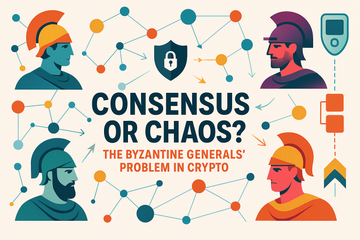The Byzantine Generals’ Problem isn’t just a mouthful—it’s an age-old brain teaser nested at the heart of every cryptocurrency and decentralized network. Think about it: how can you ever be sure the person (or node) you’re talking to hasn’t misunderstood you, or, worse, is working against you on purpose? Let’s untangle this legendary game theory puzzle and see why it still echoes across the world of crypto (with a quick detour through hardware wallets and some of life’s daily conundrums).
Picture This: Generals, Rumors, and the Midnight Attack
Imagine a ragtag group of generals, each leading an army camped outside a fortified city. They need to act together—attack all at once or retreat all at once. Anything else is a disaster. But the kicker? Some of these generals might be traitors, spreading bad orders or fake news. Messages have to travel sneaky, breakable paths—like whispered secrets at a crowded party. If just one general (or node, in techie terms) gives the wrong order, the whole plan crumbles. Sound familiar? Now swap generals for network nodes and you’ve got the Byzantine Generals’ Problem in a nutshell.
Why Is It Called ‘Byzantine’ Anyway?
Well, the real Byzantine Empire was notorious for its political intrigue—backstabbing, double-crossing, and a general atmosphere best summed up as, let’s say, 'dicey.' The name stuck because the metaphor’s perfect for situations where you can’t trust every player at the table.
All About Consensus—Or, Getting Everyone on the Same Page
So what's the real problem? Reaching consensus. In a classroom, you’d just ask the teacher for the answer. In crypto-land, there’s no teacher; there’s not even a classroom monitor. The generals have to rely on each other, and here’s the kicker: mathematicians like Leslie Lamport have shown that if more than a third of your gang is untrustworthy, honest agreement just isn’t possible. You need two things:
- All loyal generals (nodes) agree on the same plan
- Traitors can’t force the group into a suicidal attack (or retreat)
Honestly, doesn’t that sound a bit like trying to organize a group chat where no one secretly wants chaos?
The Blockchain Twist—How Bitcoin and Friends Outsmart Traitors
Now, let’s fast-forward a millennium from the Byzantine siege to Satoshi’s revolution. Bitcoin, Ethereum, and the rest face a modern twist on the generals’ dilemma. They need a way for strangers around the globe—with no reason to trust each other—to agree on a public ledger without a referee.
Here’s where things get clever. Cryptocurrencies use complex protocols called consensus mechanisms. Proof of Work (Bitcoin’s secret sauce) and Proof of Stake (used by Ethereum 2.0 and others) are just different strategies for getting everyone to “attack at dawn”—meaning, to agree which transactions go into the next block. These protocols essentially reward honest generals and make it very expensive for traitors to mess things up. Attackers would need to control more than one-third of the network’s power (sometimes even half) for anything truly nasty to happen. That’s what keeps your coins safe and the network humming along.
Trezor, Ledger, and Trust in a Traitorous World
Let’s get practical. Ever heard of Trezor or Ledger? If you’re holding crypto, you probably have. These hardware wallets don’t directly solve the Byzantine dilemma, but they do help you stay a loyal general in your own personal battle against hackers. Think of them as your own little messenger, sealed and secured, making sure traitors can’t intercept your order to, say, send Bitcoin to your aunt—or worse, somewhere you didn’t mean at all. Without this extra layer of security, even a perfectly designed consensus algorithm can’t protect your assets from, well, yourself or a clever thief.
Real-World Analogies: Group Chats, Secret Santa, and Birthday Surprises
For a second, zoom out of the crypto bubble. Ever tried organizing a group trip where just one person keeps changing the plans last minute? That’s a mini Byzantine Problem. Or imagine a Secret Santa where one sneaky player tries to reveal or swap presents. Every group decision with a risk of mischief or poor communication is basically an echo of those generals before the fateful siege.
Consensus isn’t Cheap—Or Easy
But here’s the catch: the more people (or nodes) you need to coordinate, the harder it gets to keep everyone honest. Bigger networks are more resilient, true, but they also require more energy and effort. That's one of the reasons Bitcoin chews through so much electricity—it’s paying for digital trust, in a way. Systems like Trezor and Ledger step up to help individuals do their part without having to become cryptographic whizzes themselves. And with each new year, developers keep searching for more efficient, more equitable ways to keep those generals in line. Proof of Stake, hybrid models, and tech like sharding are part of today’s toolbox, aiming to keep networks secure but nimble enough to handle millions of users without running up the electric bill.
Why Does This Still Matter?
Because, honestly, trust is always in short supply—whether you’re sending Bitcoin to a friend, delegating tasks remotely, or trying to make your hardware wallet bulletproof. The Byzantine Generals’ Problem shows us that, without clear protocols and strong incentives for honesty, even the most advanced systems can fall apart under a little pressure. The lesson? Don’t take consensus for granted. Even your morning coffee order might need some Byzantine Fault Tolerance if there are enough jokers in the group.
Final Thoughts—and a Nod to Human Imperfection
You know what? The world will never be short of traitors, tricksters, or plain old miscommunication. But thanks to game theory, cryptography, and, yes, hardware heroes like Trezor and Ledger, we've at least got a fighting chance to rally the troops. Next time you see a crypto transaction whiz past on a blockchain explorer, tip your hat to those ancient Byzantine generals—they’d probably be amazed how their timeless headache became the backbone of our digital future.











